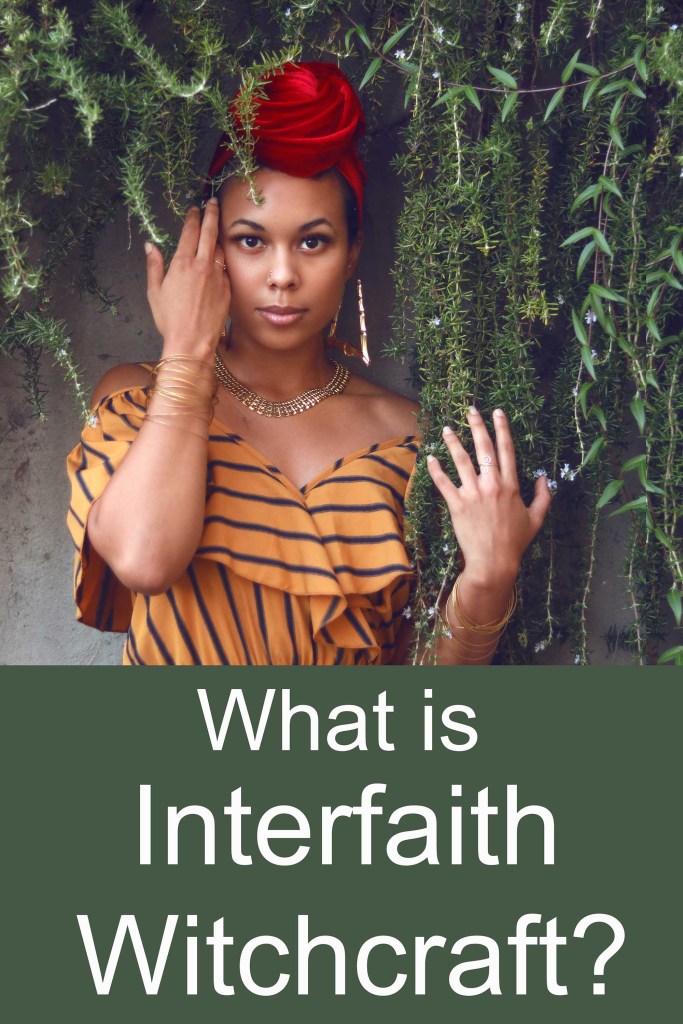An emerging approach to an ancient art, interfaith witchcraft is a modern take on the practice of magic, spell craft and nature-based spirituality.
For those practitioners who value many diverse spiritual traditions, interfaith witchcraft honors the varied ways people around the world weave meaning into their lives through spiritual practice.
Today, we talk about exactly what this means, and how it works.
“One river, many wells.”
Author Matthew Fox coined the phrase, “One river, many wells.”
Essentially, the “river” symbolizes the universal spiritual instinct innate in all human civilizations. And the “wells” represent the many religious and spiritual traditions around the world that form the expression of this instinct.
This is an excellent metaphor for the philosophical attitude of interfaith witches.
The interfaith witch recognizes that all faith traditions have inherent worth and inherent pitfalls, that no faith is superior to another and that spirituality is a deeply personal, complex experience.
What interfaith witchcraft isn’t.
People often confuse interfaith witchcraft with eclectic witchcraft.
However, while eclectic witchcraft often sources practices from many different paths to create something new and tailored to the individual, interfaith witchcraft attempts to appreciate different traditions in their original context.
For example, an interfaith witch may attend a ritual in honor of a Celtic goddess, or an Egyptian witchcraft ritual. She may participate, ask questions and learn.
And of course, her personal spiritual philosophy may be influenced and informed by these experiences.
But her goal is to learn about these paths without necessarily borrowing from them and incorporating them into her own practice.
Benefits of an interfaith approach.

Interfaith witchcraft comes with a wide array of benefits. This list is by no means exhaustive!
Recognize universal truth. Observe the transcendent archetypes universal to all spiritual paths. The driving themes of love, connection and embracing the mysteries of life thread themselves through nearly every religious tradition around the world. Interfaith witchcraft fosters a recognition of this reality and naturally dispels the sense of division we often feel as members of separate faiths.
Challenge your stereotypes and prejudices. If you never interact with other faith communities, you’re only ideas about them are based on what you’ve heard or think you know. Interfaith interactions with other religious traditions force you out of that mindset.
Make friends who think differently than you. Humans naturally tend to surround themselves with people who act, think and look like they do. If you ask me, it’s one of the worst things we do to ourselves. Make friends with people who think about spirituality differently than you, and crack your worldview wide open.
How to start down the path of the interfaith witch.
Sound interesting? Let’s talk about some ways to begin walking this fascinating path.
Start from where you are.
You likely already practice some form of magic, or even devoted yourself to one particular form of witchcraft years ago.
That’s totally fine. In fact, there is no need to leave that path in order to incorporate an interfaith approach.
Again, the goal is not replace or dramatically alter your current practice, but to enrich it.
Go where you are welcome, and be honest about who you are.

Never, never “crash the party” of another faith tradition, or pretend you are someone you are not in order to gain access.
Really, there is no need to do that anyway.
Most religious traditions hold at least some public events and welcome visitors.
There is no need to lie or pretend. But you should know your limits.
For example, I personally enjoy participating in monotheistic events. My friends often invite me to Jewish Seder rituals, Christian festivals (I especially like the Eastern Orthodox ones!) and Hindu temple events.
I rarely turn them down!
But I always make it clear that I’m just there to learn, and I have no intention of converting.
That doesn’t mean no one ever encourages me to. Personally, I am quite comfortable with brushing off attempts at conversion. You’d be surprised at how rarely it ever even comes up. When it does, I always remember that the person likely has the best intentions, and I never take it personally.
However, if you strenuously object to a particular practice or have difficulty handing encounters like this respectfully, they’re best avoided.
Similarly, people sometimes ask me what my faith background is. I make it a point to never lie about that.
However, that doesn’t mean you need to full on come out of the broom closet, especially in places where your practice might be misunderstood.
There are many way to handle this matter. Sometimes I just say, “For me, spirituality is a private matter” or “I try to avoid labels” or “I am of no particular denomination.”
All these statements are true for me, and they usually go over much better than “Sometimes I draw gigantic pentacles on my basement floor in chalk and burn a bunch of candles in honor of the full moon.”
Think for yourself.
At the core of interfaith witchcraft is the principle of independent religious thought.
Exploring and learning about a wide variety of faith traditions encourages you to generate your own unique ideas about spiritual life. In turn, this further deepens your understanding of your own practice.
Use that. Embrace it.
Because ultimately, when you think independently, it forces you to take responsibility—for your life, your actions and the way you interact with the world.
Always give something back.
If a church, temple, coven or other religious organization welcomed you to an event, make sure you honor the time they took to include you.
Never leave an experience with another spiritual tradition without giving something back.
Whether it’s a monetary donation to the temple or a contribution to the church’s upcoming food drive, find something you believe in supporting and support it.
Blessed be.


